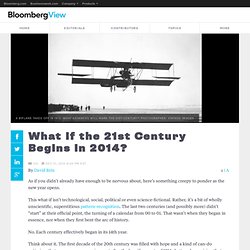

8 Reasons Future Generations Will Consider Us Barbarians. 5 Popular Beliefs That Are Holding Humanity Back. Humans believe in a lot of stupid shit, and we do something stupid as a result of those beliefs about, oh, once every five seconds. And sure, most of you reading this are educated types who don't believe in Bigfoot or psychic readings, but there are a whole bunch of equally stupid/harmful superstitions out there that are so commonly held that we don't even think of them as such. Very few of us don't fall victim to at least a few of them. In fact, I'm something of an expert on this because I believe literally hundreds of idiotic things, and also because I wrote a ridiculous best-seller about an apocalypse brought about by people believing in apocalypses.
And I say that, in order to keep humanity from imploding, we have to give up believing ... #5. Jupiterimages/Photos.com/Getty Images Every decision they make, and every vote they cast, is done with this in mind. And this affects your life. At this point my young atheist readers are saying, "Exactly! And I think it's bullshit. The Sky Isn't Falling: Healthcare Triage #9. Human Intelligence: The Flynn Effect. This page is now located at an updated address.

Please update your bookmarks! The new address is posted below. You will be redirected to the new page in 15 seconds or you can click the link below. The Flynn Effect Originally prepared by: Charles Graham (fall 2001)Revised: Jonathan Plucker (fall 2002) The Flynn Effect deals with the issue of how the general IQ scores of a population change over time. Outline (back to top) Introduction How large are the IQ gains? Where is the IQ test data from? What are possible causes for the Flynn Effect? Why must IQ tests be constantly restandardized? Who has written about the Flynn Effect? Introduction (back to outline) In his study of IQ tests scores for different populations over the past sixty years, James R.
Think Again: War - By Joshua S. Goldstein. "The World Is a More Violent Place Than It Used to Be.

" No way. The early 21st century seems awash in wars: the conflicts in Afghanistan and Iraq, street battles in Somalia, Islamist insurgencies in Pakistan, massacres in the Congo, genocidal campaigns in Sudan. All in all, regular fighting is taking place in 18 wars around the globe today. Public opinion reflects this sense of an ever more dangerous world: One survey a few years ago found that 60 percent of Americans considered a third world war likely.
Expectations for the new century were bleak even before the attacks of Sept. 11, 2001, and their bloody aftermath: Political scientist James G. Gapminder: Unveiling the beauty of statistics for a fact based world view. Hans Rosling: Let my dataset change your mindset. The Economics of Star Trek — Editor's Picks. I promise this is about Star Trek.

Sort of. Bear with me a moment. I’ve been reading a lot about robots lately. When I read about robots, and the future, I can’t help but think about it in economic terms. And that inevitably turns my mind to the branch of economics called post scarcity economics. What If the 21st Century Begins in 2014? As if you didn’t already have enough to be nervous about, here’s something creepy to ponder as the new year opens.

This what-if isn’t technological, social, political or even science-fictional. Rather, it’s a bit of wholly unscientific, superstitious pattern-recognition. The last two centuries (and possibly more) didn’t “start” at their official point, the turning of a calendar from 00 to 01. That wasn’t when they began in essence, nor when they first bent the arc of history. Are Poor Countries Doomed? GOOD NEWS: 14 Reasons 2014 May Be the Best Year Ever. Why 2012 was the best year ever. Never in the history of the world has there been less hunger, less disease and more prosperity Has national morale ever been as strong as it was during the Jubilee and the Olympics? Photo: Getty Images. The below is from The Spectator, the best-written and most entertaining magazine in the English language. To read the whole magazine on iPad/iPhone, click here for a free trial. Or click here for a Kindle free trial. It may not feel like it, but 2012 has been the greatest year in the history of the world.
To listen to politicians is to be given the opposite impression — of a dangerous, cruel world where things are bad and getting worse. Take global poverty. The doom-mongers will tell you that we cannot sustain worldwide economic growth without ruining our environment. And what about the concerns that the oil would run out? Advances in medicine and technology mean that people across the world are living longer. Nature can still wreak havoc. The Future According To Google's Eric Schmidt: 7 Points - Corporate Intelligence.